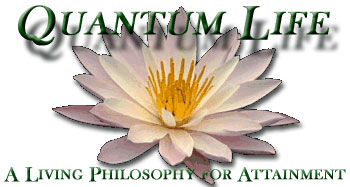Proud
Member
of USAWKF
of USAWKF
Circumstances in this Life
April 9, 2006
This is an excellent question. In Buddhist terms, the answer is a result
of several aspects of karma. At its simplest level, the observation that
some people born into privilege and seem to lead lives of utter uselessness
while others born to all manner of adversity seem to rise to inspire and
elevate the lives of others is a result of the ways these people choose
to react to their particular circumstances. This is really an unfair and
distorted understanding of the great complexities at work.
First it is paramount to understand that our perception of the world
is temporal. Buddhism demonstrates that all phenomena in the universe
is impermanent. In other words, the true nature of everything we perceive
as "real" and "permanent", is in fact constantly in
change, beginning and ending constantly in response to causality. OK,
layman's terms, the wooden chair in your home looks permanent enough.
However, you would not disagree that it was not in existence 1000 years
ago, or in fact that the tree it was made from existed 3000 years ago.
In the same fashion, it is easy to see the chair, right there in front
of you, as no more than dust and decay, 1000 years from now. The fact
is, that this change is constant and going on in front of you right now.
To make matters even more interesting, consider that at a molecular level,
the chair you "see" is 90% space. Now you're twisting your melon.
This "reality" also applies to you and I, by the way. It is
in this "space" that all the forces of life exist. And that
is my book "Quantum Life".
Now let's introduce another concept of Buddhism, karma. There are three
karma equations. The simplest translation for karma is action, that is
action as thought, word or deed. Any conscious decision creates energy
termed in Buddhism as causal. You put your hand in fire (cause) it burns
(effect). In this same way, Karma with a capitol "K" refers
to cumulative causal energy over time. You keep putting your hand in fire
(cause+cause+cause) you die (effect), notice only one effect for cumulative
cause. The third is a further extension too large to define in minute
detail here, but essential to our understanding of the question posed.
This third concept is that of "Ichinen Sanzen". Ichinen is the
karmic equivalent of all the causal energy driving your life force through
this existence, and Sanzen is the scope of this karma throughout the 1000
realms of existence, past, present, and future. We will come back to this
in a moment. For now, let's move on to the nature of human birth in Buddhist
philosophy.
Here is an excerpt from my essay on Birth and Death;
"Most convention sees the birth process as just that, a process. Spermatozoa, in a chance sprint, bombard an Ovum, with a percentage of success dependant on Sperm and Ovum "Joining" together to initiate the development of "life". But, as we have already defined life in many repeated ways, Life cannot exist in this manner. If all that is needed is two biological cells, then why do not menstrual cycles fill our sewers with children? All those ovum spilled into the waters of the world. Or for that matter, sperm and any dust mites or bacteria etc. And what of the thousands that do not develop. The answer is obvious; that all life requires volition! Volition is the driver of all consciousness to participate in the "duality" (differentiation) of sperm and ovum. That consciousness is affected by, or influenced by, the conscious participants in the development of the embryo. This will alarm the factions surrounding the abortion debate, but the fact is that the consciousness is the first to arrive on the scene. In fact, the development of the embryo cannot proceed without this consciousness (volition)."
This "volition" I refer to is the Buddhist concept of wilfulness understood as causality. The cause of life to manifest in this "reality" as human "being", is manifest from a tremendous history of causality. So, the point here is that each individual is "born" through a causal matrix and then left with its residual effects and "free will" or causal abilities to influence and absorb experience according to that individual's mastery of its life conditions.
Pheeew! That was a mouthful. Let's try to simplify this. If all poverty
were "real" and "permanent", then any one born in
poverty would have no chance of changing it. And if human birth simply
consisted of sperm and ovum, why should not each person in poverty look,
behave, and die in exactly the same fashion. The Buddhist proposition
is that this is because, firstly, poverty is only a perception, and one
that changes constantly as it is perceived differently by each and every
"being". Secondly, the perception of a glass half full or half
empty is a terrific illustration of the different perceptions afforded
by differing life conditions. If you are happy, the glass is almost full,
if you feel distressed or worried, the glass is almost empty. These perceptions
are causal, remember? So if your cause is to "see" the glass
as almost full, there is plenty of refreshment for your "need",
and you can raise your life condition. If not, well, you get the picture.
It is also true, by extension, that a life condition (largely considered
attitude in Buddhism) that is awakened to the impermanence of all phenomena
is far less distressed about the "condition" of things, than
someone whose life condition is deeply attached to material illusions.
In Buddhism, this is the crux of all suffering. And this awareness knows
not, poverty, wealth, anguish, elation, or any other ephemeral states.
So, to answer your question again, people life conditions are not defined by their surroundings, but rather the other way around. Our lives are truly what we make of them. And our perception of our surroundings and illusory attachments to impermanent material "things" deeply affect our experience of life. That being said, not one of use can "compare" our experience to any other in the hopes of finding empirical clues to living "correctly". There is no such empiricism at work. Each path is unique, and the Buddha taught that the most expedient way to get everyone on the same "page" was to get them all pointed at enlightenment. The path becomes irrelevant if the destination is clear.
In this way, I interpreted the Buddha's teaching in the everyday experience of parent to child relations to demonstrate the expediency of parents in higher life conditions, to alleviate their children's suffering by leading them, or guiding them along more expedient paths to reduce suffering and point the way to a more quickly enlightened destination. We should all be so lucky.
I hope this helps your understanding.
With my gratitude and respect,
Reverend Sylvain Nyudo
BACKGROUND
This letter was in response to a letter from the Reverend's mother concerning a long standing question of her's brought back by an earlier writing on parental guidance by Sylvain Nyudo.
Here is the original letter;
I just finish reading your newsletter. Very inspiring and so very true.
There is a question that I need to ask you; it always baffled me. How
can you explain that sometimes through adversity, and poor parenting or
the complete lack thereof, some children become a very bright light in
the world with self-discipline and highly motivated?
I really enjoy and feel inspired by your quiet wisdom.
Sending lots of love your way,
Mom












